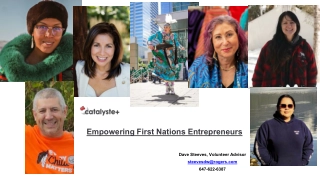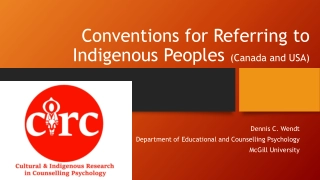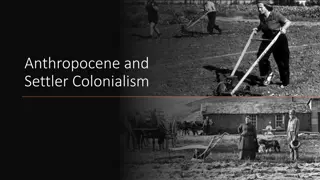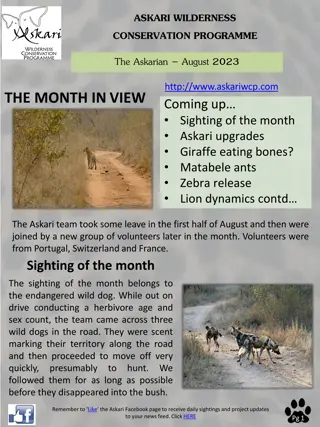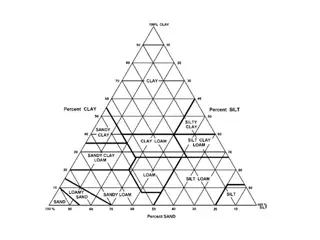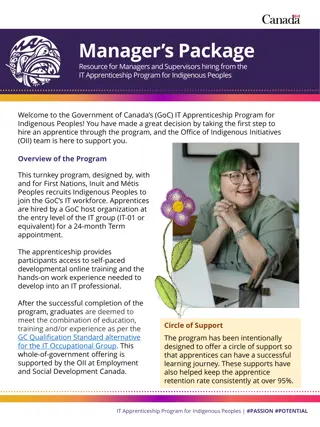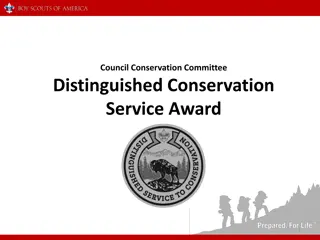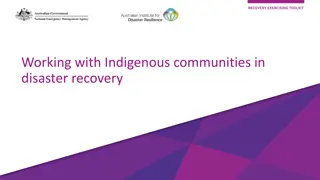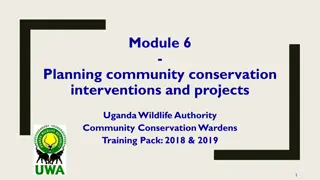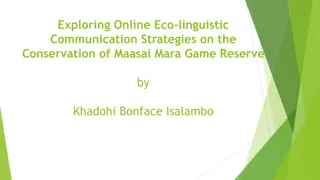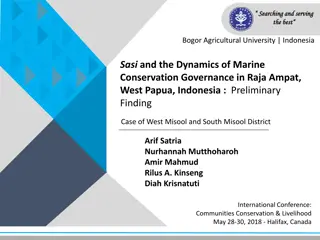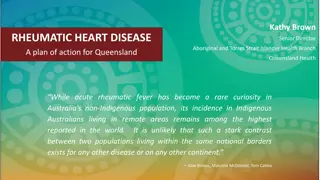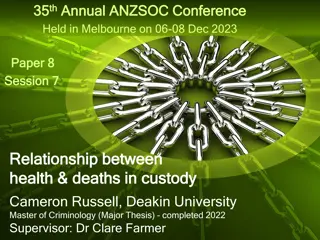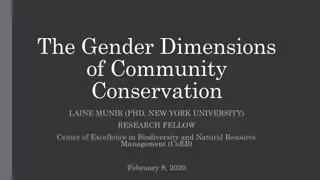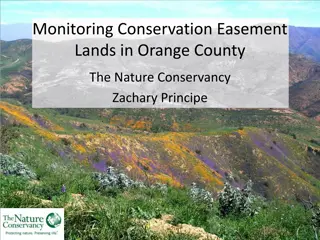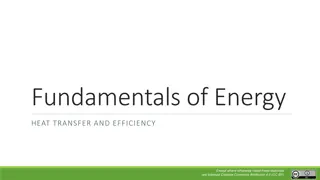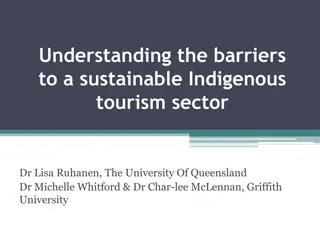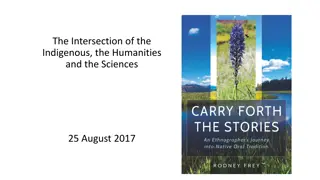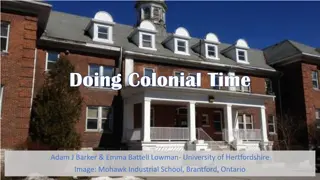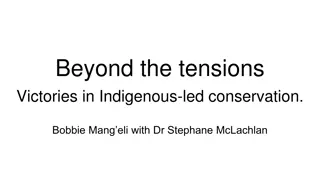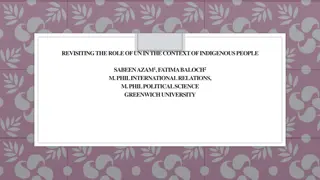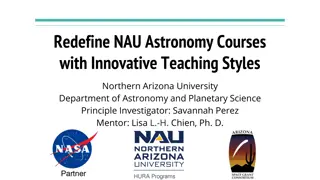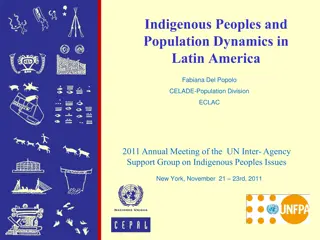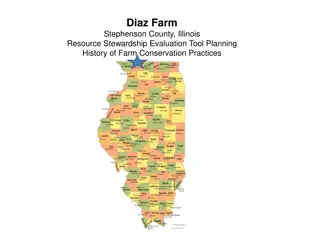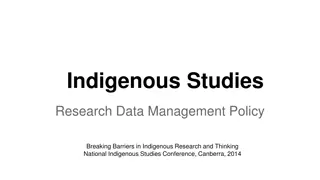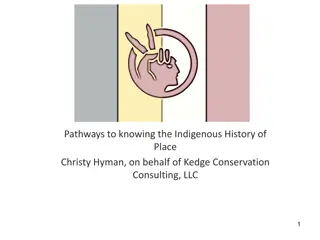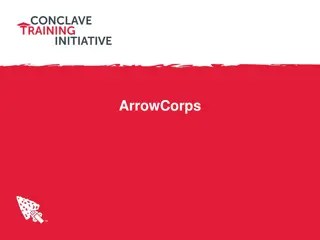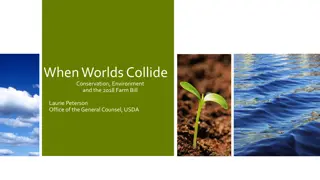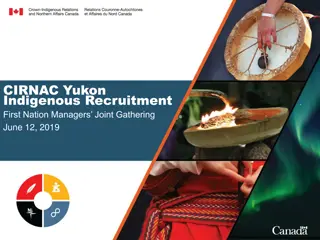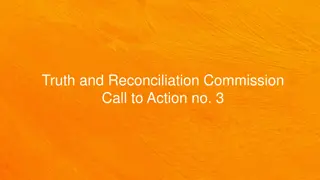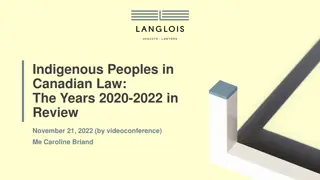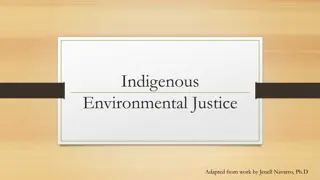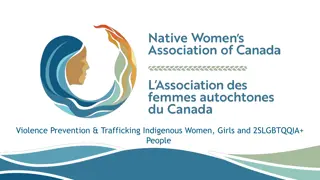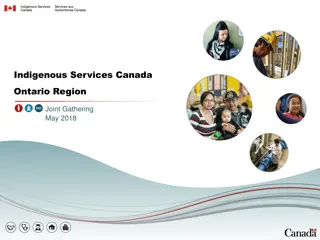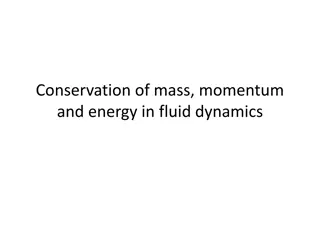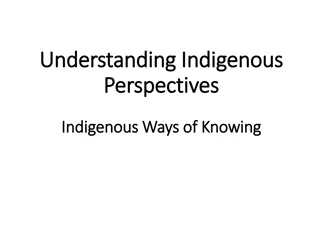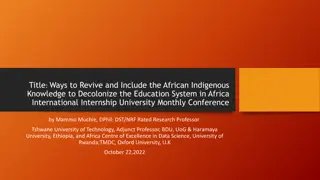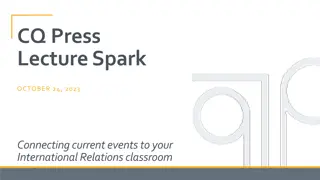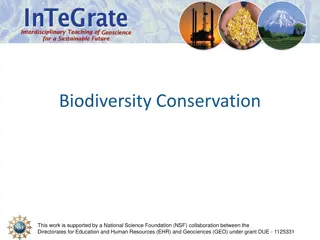Empowering First Nations Entrepreneurs
Empowering First Nations Entrepreneurs is a program by OFNEDA, a Canadian economic development organization, providing guidance and support to Indigenous entrepreneurs. The initiative matches Indigenous partners with experienced volunteer advisors to enhance capacity-building and facilitate communit
0 views • 28 slides
Conventions for Referring to Indigenous Peoples in Canada and the USA
This article outlines guidelines for referring to Indigenous Peoples, emphasizing specificity and respect for preferred names and terms. It discusses the importance of capitalizing terms related to Indigenous Nations and cautions against using terms implying colonial possession. The use of terms lik
1 views • 24 slides
NRCS Programs Update
The Inflation Reduction Act (IRA) provides $20 billion to support USDA's conservation programs focusing on climate-related benefits and agricultural resilience. It allocates funds for programs like the Environmental Quality Incentives Program, Agricultural Conservation Easement Program, Regional Con
2 views • 14 slides
Understanding Settler Colonialism and Its Impact in the Anthropocene
Settler colonialism, a structure of domination, aims to permanently transfer settlers to Indigenous lands, leading to ongoing dispossession and conflict. This form of colonialism disrupts Indigenous nationhoods, political practices, and sovereignties. The dispossession of Indigenous bodies and lands
0 views • 8 slides
Askari Wilderness Conservation Programme August 2023 Newsletter
The Askari Wilderness Conservation Programme's August 2023 newsletter highlights the team's encounters with endangered wild dogs, upgrades to the conservation area including the building of a waterhole, unique wildlife sightings like a giraffe eating bones, and observations of Matabele ants. Volunte
1 views • 5 slides
Effective Methods for Soil Conservation
Methods to reduce soil erosion and promote soil conservation include terracing, contour planting, strip cropping with cover crops, alley cropping, agroforestry, windbreaks, and conservation tillage practices such as no-till and minimum tillage. These methods help in minimizing soil erosion hotspots
2 views • 11 slides
Indigenous IT Apprenticeship Program Overview
The Government of Canada's IT Apprenticeship Program for Indigenous Peoples offers a comprehensive 24-month term appointment to develop Indigenous individuals into IT professionals. Supported by the Office of Indigenous Initiatives, the program provides hands-on work experience and online training,
0 views • 6 slides
Council Conservation Committee Distinguished Conservation Service Award
The Council Conservation Committee Distinguished Conservation Service Award is a prestigious recognition in scouting, involving projects, workbook completion, and assessment by a Council Board of Review. Councils must establish their own policies for administering the award. Scouts recognized with a
1 views • 20 slides
Understanding Indigenous Communities in Disaster Recovery
Increased understanding of intrinsic strengths and unique impacts of disasters on Indigenous communities, role of Indigenous community-controlled organizations, importance of connection to Country, and need for engagement with Indigenous communities by emergency management agencies. Disasters have u
0 views • 21 slides
Understanding Conservation Project Planning Basics
This module explores basic terminology in conservation project planning, focusing on key concepts like project, intervention, and community project. It delves into understanding the steps involved in planning for conservation projects, with a special emphasis on terminology and definitions essential
0 views • 44 slides
Strategies for Online Eco-Linguistic Communication in Maasai Mara Conservation
Maasai Mara faces threats from human encroachment, prompting conservation efforts. This study explores online eco-linguistic strategies for engaging the public in conservation activities. The importance of language in online communication to achieve ecological harmony is highlighted, emphasizing eco
0 views • 17 slides
Marine Conservation Governance in Raja Ampat, West Papua, Indonesia
Explore the dynamics of marine conservation governance in Raja Ampat, West Papua, Indonesia, with a focus on Sasi practices and the preliminary findings in the West Misool and South Misool districts. Discover the potential resources in Raja Ampat and the various types of marine conservation areas in
0 views • 22 slides
Addressing Rheumatic Heart Disease Disparities in Indigenous Australians
Rheumatic heart disease (RHD) continues to disproportionately affect Indigenous Australians, particularly those living in remote areas, with a high incidence compared to the non-Indigenous population. Acute Rheumatic Fever (ARF) is a key precursor to RHD, often linked to social determinants and poor
0 views • 7 slides
Relationship Between Health and Deaths in Custody in Australia
In Australia, the relationship between prisoner health and deaths in custody is a critical issue. Indigenous inmates are disproportionately affected, with higher death rates compared to non-Indigenous inmates. Addressing prisoner health may offer a potential solution to reducing custodial deaths. Th
0 views • 32 slides
Exploring Gender Dynamics in Community Conservation
This research delves into the intricate relationship between gender and conservation efforts, emphasizing the impact of gender roles on biodiversity loss. It discusses gender essentialism, global gender perspectives in conservation, and presents case studies on Payment for Ecological Services (PES)
1 views • 11 slides
Conservation Easements and Monitoring in Orange County by The Nature Conservancy
The Nature Conservancy plays a vital role in monitoring and managing conservation easement lands in Orange County, ensuring the protection of conservation values and natural resources. Through the Irvine Ranch Conservation Easements, they uphold specific permitted and prohibited activities while tai
0 views • 19 slides
Understanding Energy Efficiency and Conservation Fundamentals
This unit introduces basic terms related to energy, efficiency, and conservation, covering topics such as Efficiency and Conservation Energy, First and Second Law of Thermodynamics, and various heat transfer mechanisms. It emphasizes responsible energy use, focusing on efficiency, conservation, and
0 views • 14 slides
Understanding Barriers to Sustainable Indigenous Tourism Sector
Globally, tourism is seen as an opportunity for Indigenous communities. However, barriers such as economic challenges, declining demand, and competition pose significant obstacles. Research conducted in Australia aims to analyze the gap between supply and demand in Indigenous tourism and explore the
0 views • 15 slides
Exploring the Intersection of Indigenous, Humanities, and Sciences
The narrative delves into the rich tapestry where Indigenous traditions, Humanities, and Sciences meet, highlighting the contrast in approaches like logical reasoning in Sciences, spiritual origins in Indigenous knowledge, and interpretive wisdom in Humanities. It emphasizes the holistic, narrative-
0 views • 9 slides
Settler Colonialism and Carcerality: Disrupting Indigenous Relationships and Territories
This study delves into the impact of settler colonialism on Indigenous peoples, focusing on the immobilization and movement imposed on them through carceral spaces. It explores the intersections of official and unofficial carceral spaces, shedding light on the disrupting effects on Indigenous relati
0 views • 8 slides
Victories in Indigenous-Led Conservation: A Story of Partnership and Resilience
Explore the triumphs and challenges of Indigenous-led conservation efforts in Canada through community-based initiatives, the establishment of Indigenous Protected and Conserved Areas, and programs like the Guardian and Watchmen Program. Learn about the significant milestones, definitions of key ter
0 views • 23 slides
The Role of UN in Indigenous Peoples: A Critical Analysis
The research delves into the role of the United Nations in addressing the unique social, cultural, economic, and political qualities of indigenous peoples worldwide. It discusses the importance of recognizing indigenous rights, traditions, and the challenges they face in contemporary societies, emph
0 views • 7 slides
Innovating Astronomy Education at NAU Through Indigenous Perspectives
Explore how Northern Arizona University is reshaping astronomy education using innovative teaching styles with a focus on Indigenous Astronomy. Gain insights into effective teaching methods, the importance of Indigenous Astronomy lab content, teaching approaches, and creating engaging lab materials.
0 views • 7 slides
Indigenous Peoples and Population Dynamics in Latin America
Latin America is a region with diverse indigenous groups, facing demands for recognition and rights. The importance of information, especially from censuses, is crucial for developing policies and programs to support indigenous peoples. Various data sources such as censuses, surveys, and registries
0 views • 19 slides
Diaz Farm Conservation Journey in Illinois
Explore the 17-year conservation journey of Diaz Farm in Stephenson County, Illinois, led by Dan Diaz, focusing on sustainable land management practices and the use of Resource Stewardship Evaluation Tool for conservation planning. The farm's history, conservation engagement with various organizatio
0 views • 9 slides
Indigenous Studies Research Data Management Policy: Breaking Barriers in Indigenous Research
Covering cultural rights, Indigenous data custodianship, policy developments, and ATSILIRN protocols, this presentation at the National Indigenous Studies Conference in 2014 highlights key issues and approaches in managing research data in Indigenous studies.
0 views • 61 slides
Understanding the Impacts of Colonialism on Indigenous Communities
The article delves into how East Coast Indigenous communities were profoundly affected during the colonial period and beyond, enduring forced removals, enslavement, attempted genocide, and subjugated statuses. It explores the historical realities that continue to shape the presence and representatio
0 views • 18 slides
Understanding Conservation and Taking Action
Explore the purpose of conservation and learn how to plan and execute conservation projects using local, regional, and national resources. Discover the legacy of the ArrowCorps service project and understand the difference between conservation and preservation. Identify conservation issues and resou
0 views • 12 slides
Conservation Challenges and Opportunities in the 2018 Farm Bill
The 2018 Farm Bill presents a battleground where conservation, environmental protection, and agricultural interests collide. Key issues include changes in the Clean Water Act, pesticide use, CAFO operations, NEPA requirements, and potential impacts on conservation programs like the Conservation Stew
0 views • 7 slides
Indigenous Recruitment Action Plan Overview
CIRNAC Yukon developed an Indigenous Recruitment Action Plan focusing on three themes: Outreach, Renewing the job advertisement, and Mentorship. The plan includes various activities such as attending job fairs, partnering with colleges, and creating employee profiles to attract local Indigenous cand
0 views • 12 slides
Call to Implement Jordan's Principle for Indigenous Children
The Truth and Reconciliation Commission's Call to Action No. 3 emphasizes the need for all levels of government to fully implement Jordan's Principle, which prioritizes the needs and well-being of Indigenous children. Highlighting the story of Jordan River Anderson, the call underscores the importan
0 views • 19 slides
Indigenous Rights Litigation in Canadian Law: A Review of 2020-2022
Strategic considerations in Indigenous rights litigation, social acceptability in decision-making, Indigenous identities, and future expectations were discussed in a review from November 21, 2022. The case of Southwind v. Canada highlighted issues of fiduciary obligations and equitable compensation
0 views • 50 slides
Understanding Indigenous Environmental Justice & Biodiversity Interconnection
Exploring the intricate relationship between Indigenous environmental justice, biodiversity, and cultural diversity as discussed by Jenell Navarro, Ph.D., and Winona LaDuke. The impact of settler colonialism, capitalism, and loss of Indigenous populations on environmental degradation is highlighted.
0 views • 9 slides
Understanding Violence Prevention and Trafficking in Indigenous Communities
Explore key terms like assimilation, colonialism, discrimination, grooming, and human trafficking in the context of Indigenous women, girls, and 2SLGBTQQIA+ people. Learn about concepts such as intergenerational trauma, patriarchy, racism, and settler colonialism that impact these communities. Under
0 views • 32 slides
Indigenous Services Canada Achievements and Initiatives Overview
Indigenous Services Canada in Ontario region held a joint gathering in May 2018, leading to the formation of a new department focusing on improving health outcomes for Indigenous communities. The department has made significant strides in enhancing services such as healthy child development, mental
0 views • 25 slides
Understanding Conservation Principles in Fluid Dynamics and Classical Mechanics
Conservation principles play a significant role in fluid dynamics and classical mechanics. In fluid dynamics, conservation of mass, momentum, and energy are crucial for understanding fluid behavior. Classical mechanics, on the other hand, relies on Newton's laws to describe motion and energy conserv
0 views • 46 slides
Exploring Indigenous Knowledge in Education
Delve into Indigenous ways of knowing, understanding, and learning, emphasizing the importance of integrating traditional Indigenous pedagogies in education. Learn about the characteristics, sources, and values of Indigenous knowledge, and explore the intersection of Indigenous knowledge with Wester
0 views • 46 slides
Reviving African Indigenous Knowledge for Decolonizing Education
Mammo Muchie, a distinguished DPhil and research professor, will address the urgent need to revive African Indigenous Knowledge within the education system to decolonize it effectively. The conference will explore the key characteristics of Indigenous Knowledge, highlight the exemplary model of Imho
0 views • 84 slides
Australians Reject Indigenous Advisory Panel: Impact & Challenges
Australians recently voted against establishing an Indigenous advisory panel, highlighting inequities faced by Indigenous Australians. The referendum faced misinformation and lacked clarity on its benefits. The rejection raises questions on addressing Indigenous issues, impacting Australia's global
1 views • 5 slides
Understanding Biodiversity Conservation and Its Importance
Exploring the concept of biodiversity conservation supported by the National Science Foundation, this work delves into the impacts of human activities on biological diversity, compares current extinction rates with past events, evaluates species conservation priorities, and distinguishes between ex
0 views • 16 slides
